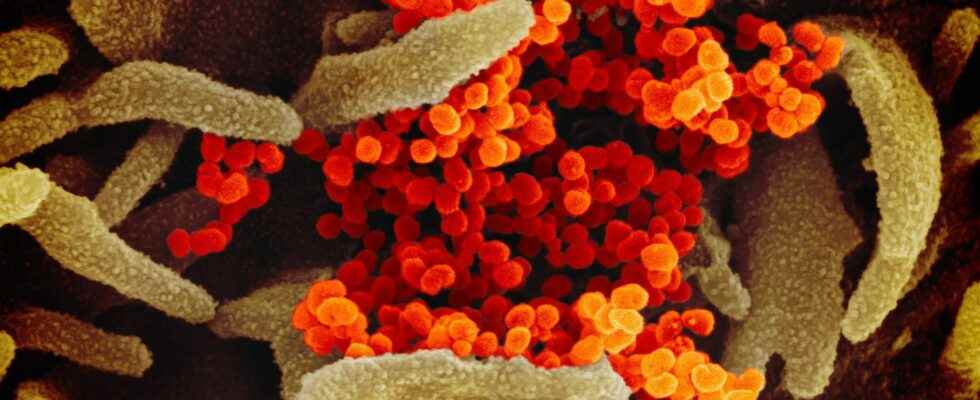It’s a little game of perpetual genomic evolution that doesn’t appeal to fragile people. BQ.1.1, the new Omicron variant subline continues to surprise with its ability to evade immune defences. For the past few weeks, this virus has been spreading in France, and according to the latest count from Public Health France, it would have become the majority in new contaminations with 58% of cases. The latest mutations observed on this virus now seem to give it a new advantage over its competitors. “BQ.1.1, like the other Omicron sub-variants, continues to seek ways to sneak into a population that is largely immune,” explains Olivier Schwartz, director of the Virus and Immunity Unit at the Institut Pasteur.
Three additional mutations on the famous spicule (or Spike, which gives it the possibility of penetrating our cells), allow it to partially thwart our defenses, and above all to escape certain treatments. This is the case of monoclonal antibodies: antibodies created in the laboratory from the blood of patients infected with the virus and whose immune response is artificially copied. Given to prevent infection, these treatments are a solution for all people whose immune system does not respond to vaccination due to a specific disease or treatment, such as cancer drugs or taking anti-rejection drugs after a transplant. . “These three BQ.1.1 mutations have led to increased resistance of the virus to almost all available monoclonal antibodies”, explains Olivier Schwartz, who recently published a study on this subject.
Immunocompromised in difficulty
To protect themselves from a severe form of Covid-19, immunocompromised people could thus until now count on Evusheld, a cocktail of antibodies developed by the AstraZeneca laboratory, but the latter no longer has any effect against this new version of the virus. Same disappointment for Bebtelovimab, a synthetic antibody developed by the American laboratory Lilly, which remained functional against BA.4 and BA.5. Long requested by the French health authorities because it was not available in Europe, the latter was withdrawn from the recommendations in the United States, its effectiveness against BQ.1.1 being reduced to nothing.
“Monoclonal antibodies are very well adjusted to viruses and faced with Omicron, this drop in effectiveness was foreseeable. Unfortunately today in pre-exposure treatment there is almost nothing that works against BQ.1.1”, explains Pierre Tattevin, professor of infectious diseases at the Rennes University Hospital Center And while the epidemic is picking up again, the situation is particularly difficult to live with for the 300,000 immunocompromised people in France.
Not protected by vaccination (despite sometimes repeated booster doses), the most vulnerable people are therefore often forced to strictly respect barrier gestures, or even to isolation. “This population remains the most affected by the serious forms of the disease, recalls Yvanie Caillé, president of the Renaloo association which brings together patients with kidney pathologies and transplant recipients. In the first half of 2022 in France, they represented 43% of people admitted in critical care”. New treatments should be developed, “but they will not necessarily be available before the fall of 2023 and therefore for the moment we are in a kind of therapeutic impasse”, underlines the president of Renaloo.
New treatments under study
Finding the right antibodies that will resist future variants is no small feat. “We are in a sort of perpetual race between the evolution of the virus and the identification of antibodies that continue to work”, explains Olivier Schwartz. For this, scientists are studying the immune response of people infected with the most recent variants of Omicron. Virological work to find the right antibody: one that could target a specific part of the virus, very unlikely to mutate because it is essential for the survival of the virus.
“We managed to find this on HIV, we identified and characterized hundreds of antibodies that covered a broad spectrum of the virus, and then we found an antibody that turned out to be extremely powerful because it is located in an area which has remained highly conserved over the mutations”, emphasizes Hugo Mouquet, head of the Humoral Immunology laboratory at the Institut Pasteur. With his team, this researcher is developing a promising monoclonal antibody, which could solve this problem. Two molecules are currently being tested on the new BQ.1.1 and XBB variants. “We have elements that show us good results in the laboratory, but we remain cautious,” he said.
In the absence of preventive treatments, the patients most at risk of serious forms can count on Paxlovid in the event of infection. This antiviral developed by Pfizer and which has shown very good results in protection against serious forms. “But it can be complicated to use in some patients because of the risks associated with interactions with anti-rejection drugs taken by transplant recipients in particular”, warns Professor Tattevin. There still remains the solution of Remdesivir, an antiviral once rejected for its ineffectiveness and which today seems to produce a small protection against serious forms. “It is not a miracle treatment, and then the modes of administration, under infusion, are very restrictive for the patient”, nuances this doctor.
